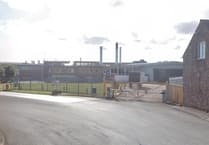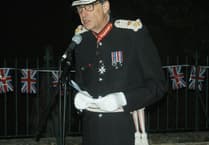RALPH Anstis, the great Forest historian, had been a civil servant in London before moving to the Forest at the end of his administrative career, and with his wife Bess started a new life as an historian, novelist and playwright, specialising in the history of the Forest, writes Dave Kent.
He had been brought up in the Waterloo area of London, and remembered in the 1920s cattle and sheep being driven to market in the centre of London.
His first home in the Forest was at Stampers Row, Parkend, the lane behind the Woodman pub, which was then called the New Inn. Stampers Row, now known as Hughes Terrace, was the location of the start of the Parkend to Milkwall and Coleford railway line, now long since gone.
Ralph’s historical works at first were based on personalities and technology in the early days of the industrial revolution – iron and tinplate works, coal mining and railways, with pioneering industrialists including the Teague and Mushet dynasties.
He wrote the definitive history of Parkend, and told the story of the Dean Forest riots and Warren James, who was exiled to Tasmania for his part in them, narrowly avoiding a death sentence.
Blood on Coal was the title of his description of the 1929 Forest coal mining strikes.
Later, he moved on to biography and fiction, but all with a historical theme.
His ‘Four Personalities of the Forest of Dean’ contains short biographies of John Wyntour, the English Civil War general, Catharina Bovey, the philanthropist of Flaxley Abbey, Timothy Mountjoy, the 19th Century trade unionist and Charles Dilke, the socially disgraced London politician who found redemption in his dedicated work in supporting his new constituents as an active member of parliament for the Forest of Dean.
The title of Ralph’s full-length novel, ‘Let the Hero Be the Hungry Man’ is a quote from Alexander’s novel ‘The Fire People’, which he wrote about a strike by workers protesting about working conditions in South Wales in the 1830s.
The hero of Ralph’s novel is Adam Turley, who leads a strike about conditions for miners in the Forest of the 1870s. The villains are the mine owners who protect their wealth at the expense of the workers in their mines.
Ralph later developed this novel into a play that was performed by Parkend Players.
It would have been easy to present the play as a conflict between the wealthy mine owners and the impoverished workers.
But Ralph cut out the mine owners from the play, and focussed in on the mining community and their responses to impending poverty.
The play presented the great dramatic options of accepting unacceptable pay cuts or staying on strike and receiving nothing, and the bitter effect that this had on the workers.
On strike, people would face hunger, sick children couldn’t be fed, there was a sense of injustice, but was there a point at which principles had to be sacrificed?
The play came to a satisfyingly ambiguous conclusion.




